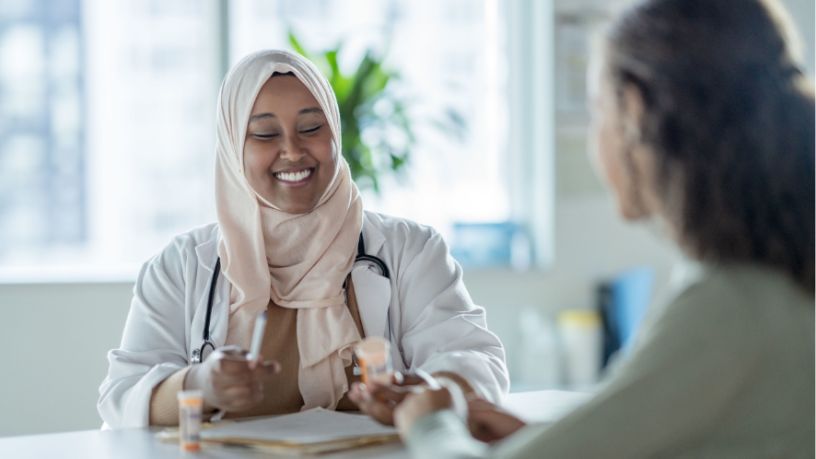It’s important to prioritise your health at every stage of your life.
Key takeaways
Staying on top of your health today may mean a healthier tomorrow.
Get to know the key health checks after 50, plus who you need to visit for each.
As you get older, preventive health through lifestyle changes is really important. While maintaining a healthy lifestyle is one key piece of the puzzle, it’s also vital to have regular and recommended health checks.
By getting health checks throughout all the key stages of your life, you may be able to detect and treat a condition before it becomes too serious.
And while it’s important to continue to stay on top of the issues that were relevant in your 20s, 30s and 40s, there are now new issues that you may need to pay closer attention to.
Here, we look at key health issues that you should be checking from 50 onwards, from breast checks to hearing assessments.
What is a health check?
Undiagnosed medical issues can have a snowball effect on your health. Left unaddressed, they can get worse and harder to treat over time.
The purpose of a health check is to detect these potential issues at an early stage, so they can be managed as best as possible.
Your GP can examine your health and look at your lifestyle and medical history. They may also recommend further checks or screenings based on things like:
- age
- weight
- ethnicity
- pre-existing conditions
- family history.
It’s a good idea to request a health check from a GP you’re comfortable with, and who’s familiar with your medical history.
Key health checks for people 50 and over
As well as continuing to check the things that were relevant in your 20s and 30s and your 40s, you may now also need to stay on top of the following checks.
Breast check
Performed by: Yourself and your GP
Frequency: Regular self-checks and a mammogram every 2 years (or more frequently if advised by your doctor)
Why: One in 7 Australian women develop breast cancer in their lifetime.1 And 75% of those cases occur in those over 50.2
Detecting breast cancer early can mean a greater range of treatment options and may improve your chances of survival. It’s important to get to know your breasts so that you can notice changes more easily. Things to look for include:
- changes in the size or shape of your breasts or nipples
- changes in the skin over the breasts, such as redness, dimpling, lumps or lumpiness.
National breast cancer screening program BreastScreen Australia offers free mammograms every 2 years to women and people who are transgender or gender diverse aged over 40. Those aged between 50 and 74 are actively invited to receive the screen.1
If you have a family history of breast cancer, talk to your GP about when and how frequently you may need a breast cancer screen.
Bupa Health Programs
Discover our programs designed to help you recover and stay out of hospital where you can.
Bone density test
Performed by: Trained specialists at a radiology service
Frequency: On your GP’s advice, depending on your risk factors
Why: Your bones require calcium and other minerals to give them strength and thickness. Otherwise, you risk developing osteoporosis, a health condition that leads to brittle bones, making them vulnerable to fractures.
A bone density scan is the most accurate way to assess your bone health. A ‘dual-energy X-ray absorptiometry’ (DEXA) scan is painless and involves a very low dose of radiation.
The DEXA scan is usually only recommended to certain people, such as post-menopausal women over 45 or men over 50, including those:
- with a history of previous fractures (including a family history)
- who smoke or drink a lot of alcohol
- with a vitamin D deficiency
- with a low body weight
- on certain medications
- with certain medical conditions.3
Bowel cancer test
Performed by: You and a pathology lab
Frequency: Once every 2 years, or more frequently as advised by your GP
Why: Bowel cancer is one of Australia’s most common cancers, and the risk of developing it rises significantly from the age of 50.4
Screenings generally test for blood in the stool, which can be an early warning sign of bowel cancer. The screening is usually carried out through an ‘immunochemical faecal occult blood test’ (iFOBT), a simple home test that you can send to a laboratory for analysis. Results are then sent back to you and your doctor.
A positive iFOBT result doesn't necessarily mean you have bowel cancer, but it does generally mean you have an increased risk. Your doctor may investigate further, often with a colonoscopy.
The National Bowel Cancer Screening Program offers free iFOBT kits to eligible Australians aged between 45 and 74 every 2 years.5 If this means you, talk to your GP about a potential screening. If you’re outside of this age range, have a family history of bowel cancer or are concerned, talk to your GP about whether the test is appropriate for you.
Hearing assessment
Performed by: Hearing health professional, arranged by your GP
Frequency: As symptoms occur
Why: In Australia, approximately 3.6 million people have some kind of hearing loss.6 But many hearing conditions are preventable.
Hearing problems can significantly affect your quality of life, and your risk of hearing loss increases with age. Your doctor can treat minor conditions that cause temporary hearing loss, such as ear infections, but for more serious problems you may be referred to a specialist hearing health professional.
Resources
The National Bowel Cancer Screening Program provides information and resources, including free screening kits to eligible Australians.

At Bupa, trust is everything
Our health and wellbeing information is regularly reviewed and maintained by a team of healthcare experts, to ensure its relevancy and accuracy. Everyone's health journey is unique and health outcomes vary from person to person.
This content is not a replacement for personalised and specific medical, healthcare, or other professional advice. If you have concerns about your health, see your doctor or other health professional.
1Australian Government, Department of Health and Aged Care. (2023). About the BreastScreen Australia Program. Australian Government
2Cancer Council. (2024). Early detection of breast cancer. Cancer Council.
3Healthdirect. (2023). Bone density scan. Healthdirect.
4World Health Organization. (2023). Colorectal cancer. World Health Organization.
5Australian Government, Department of Health and Aged Care. (2024). National Bowel Cancer Screening Program. Australian Government.
6Australian Government, Department of Health and Aged Care. (2024). About ear health. Australian Government.
You might also like...
Health checks and screening at every stage of life
It’s important to make sure you get the right health checks throughout your life, from your 20s to your 50s and beyond. Check out our guide to learn more.
9 ways to make the most of your GP check-up
Doctor’s appointments can feel overwhelming and there can be a lot to get through in a short amount of time. So how can you get the most out of your GP visit?
Health checks in your 20s and 30s
Even when you’re young, it’s important to stay on top of your health. Learn which health checks you should be getting in your 20s and 30s.
Health checks in your 40s
As you enter your 40s, new health issues may arise. Find out what checks you should be doing.





